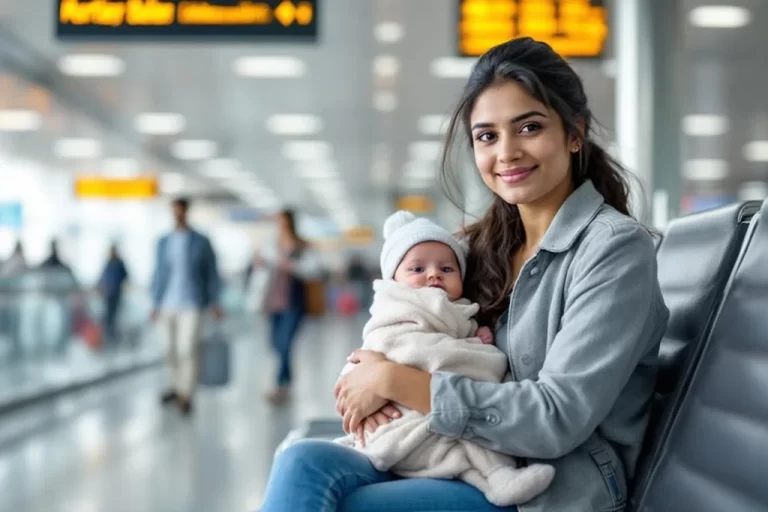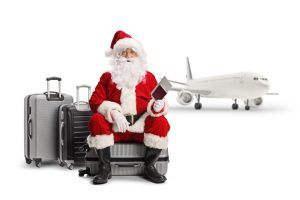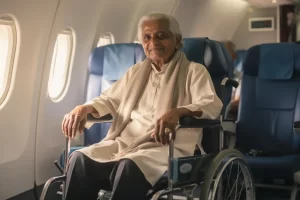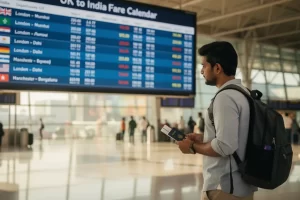Travelling with babies UK to India and toddlers UK to India, or on Australia–India international flights, requires a little extra planning. Indian families, students, and working professionals can make the journey smoother by understanding baby travel rules and toddler travel rules, including regulations about bassinets, bulkhead seats, car seats, and even milk or formula. Many airlines allow families with young passengers to board early, giving them extra time to settle in. This guide offers simple, helpful information for stress-free travel with young children on UK to India flights.
Inshorts: Quick Points for Baby Travel
Bassinet seats are available on long-haul flights but need early booking.
Bulkhead seats usually have space for bassinets and extra legroom.
You can carry enough baby milk, formula, and food without strict limits.
Car seats are allowed, but must be approved and used properly.
Children under 2 can travel on a lap or own seat, with different fares.
Always carry your child’s own passport, birth certificate, and vaccination proof.
It may be difficult to make up a powdered milk formula on the flight, so prepackaged ready-to-feed formula milk is a more reliable option.
Be aware of the airline’s luggage allowance and hold luggage allowance for baby items.
When passing through UK airports, airport staff are available to assist families with young children, making security checks and boarding easier.
It is advisable to have travel insurance that covers your child and family for peace of mind during international travel.
Bassinets and Bulkhead Seats: Comfort on the Flight for Children Travelling
For babies weighing under 11 kg and less than about 12 months old, bassinets are a lifesaver on long UK to India flights. These are small cribs attached to the bulkhead seats — the seats by the wall dividing cabins. Bassinets are limited and assigned on a first-come, first-served basis, especially on long-haul flights.
Bassinets are typically free but have limited availability, so book your seat early.
Bulkhead seats offer more legroom and space for baby essentials.
Airlines like Air India, British Airways, and Qantas usually provide bassinets, but you must request them in advance during the booking process.
Arrive early at the airport if your bassinet was not confirmed in advance, as requests may be fulfilled on a first-come, first-served basis.
If you want to ensure your baby has a bassinet, it’s important to book a separate seat or a bulkhead seat and confirm the bassinet request with the airline directly.
Only one infant per bulkhead row is allowed for safety reasons, so plan accordingly when booking seats.
On domestic flights, bassinets may have different weight restrictions, so check with the airline.
Milk, Formula, and Baby Food Rules for Carry On and Airport Security
Indian parents often worry about carrying milk or formula when flying internationally. Here’s some good news: Families are often allowed to bring along a baby changing bag in addition to their standard cabin luggage when traveling with infants.
You can carry enough baby milk, formula, sterilised water, and baby food in your carry on during the flight. There’s no strict limit but always check with the airline or airport security.
Breast milk (not frozen) is allowed in reasonable quantities for the flight. Frozen breast milk must be packed in hold luggage due to hand luggage restrictions.
Keep these in separate containers for easy security checks.
It’s best to bring sterilised bottles and snacks your baby likes, including soya milk or cow’s milk if required.
Most airlines provide baby changing facilities on board, but they require parents to bring their own supplies.
Airport staff at UK airports are trained to assist with baby food and milk allowances during security screening to make the process smoother for families.
Managing Flight Cancellation and Delays: Tips for Babies and Toddlers
Flight cancellations or delays can add unexpected stress to traveling with babies and toddlers. It’s important to be prepared for such situations when flying UK to India.
Always check your flight status before heading to the airport to stay informed about any cancellations or delays.
If your flight is cancelled or delayed, contact your airline immediately to understand your options, including rebooking or compensation.
Keep essential baby items like food, milk, diapers, and toys in your hand luggage so you’re prepared for extended waiting times.
Arriving early at the airport can help you manage any last-minute changes more smoothly.
Travel insurance that covers flight cancellations or delays can provide peace of mind and financial protection.
Inform cabin crew promptly if your baby becomes unsettled during delays; they are usually understanding and can offer assistance.
Being proactive about potential flight cancellations or delays can help make your journey with young children less stressful and more manageable, especially when a flight is cancelled or delayed.
Tickets, Child Passports, and Travel Documents for Children Travelling Internationally
Infants over 7 days old and under 2 years are considered infants for ticket purposes; older children need child or adult tickets.
Lap infants often pay about 10% of the adult ticket price and travel safely on an adult’s lap.
Children 2 years and above generally require a full seat with child fares.
For international travel abroad, children must carry valid passports and visas, plus birth certificates and vaccination records.
UK to India baby travel documents must include the child’s own passport and may require additional documents like birth certificates or letters proving parental responsibility.
For unaccompanied children, extra documentation and permissions are needed, especially for travel to the UK.
If you’re travelling without the other parent, it’s a good idea to bring a letter of consent from them to avoid complications at border controls.
More Tips for Travelling with Babies and Toddlers: Check In, Domestic Flights, and Airport Facilities
When booking your flight, double check the airline’s baggage allowance, including hold luggage allowance, and hand luggage restrictions for baby items, including baby food and milk.
Consider booking an overnight flight if possible, as this may help your baby sleep better and make the journey easier for all passengers.
Use a baby carrier or sling to soothe your baby during the flight, especially when moving around the cabin.
Bring wet wipes, nail clippers, and a travel cot if your accommodation does not provide one.
Take advantage of family-friendly airport facilities like nursing rooms, play areas, and changing tables to keep your small child comfortable before the flight.
Always carry additional documents such as adoption certificates, marriage certificates, or documents proving parental responsibility if family name differs between parents and child.
Keep contact details of your airline handy in case you need to confirm or modify your bassinet booking or other special requests.
Remember that only one infant per bulkhead row is allowed for safety reasons, so plan accordingly when booking seats.
Airport staff at UK airports are available to assist families with young children, helping with check-in and navigating airport security smoothly.
Final Tips for Indian Travellers
Book special seats like bassinets early—these go fast on UK to India and Australia to India flights.
Check airline rules carefully as policies differ slightly by carrier.
Pack baby essentials thoughtfully but don’t stress about milk and food limits.
Carry all necessary travel documents ready for faster check-ins.
Engage cabin crew if you need help—they’re usually supportive towards families.
Many airlines recommend that families arrive earlier at the airport when travelling with children to allow extra time for check-in and airport security.
Be mindful of how many infants are travelling with you, as some airlines limit the number per row or flight.
During take off and landing, feeding your baby or offering a dummy can help ease discomfort from ear pressure.
Consider seat selection carefully to ensure comfort for your family and other passengers.
Ensure you have appropriate travel insurance that covers your child and family for a worry-free trip.
FAQs
How do I book a bassinet seat for my baby?
Request during flight booking and confirm directly with the airline at least a week before flying. Booking a separate seat or bulkhead seat increases your chances of securing a bassinet.
Can I carry unlimited baby milk on the plane?
You can carry as much as needed for the flight, but keep it accessible for airport security checks. Frozen breast milk must be packed in hold luggage.
Is a car seat mandatory for my toddler on the flight?
Car seats are not mandatory in-flight but recommended for children with their own seat for added safety.
What documents should I keep for my baby’s flight?
Passport, visa, birth certificate, vaccination proof, and any letters of consent or additional documents proving parental responsibility.
Can I bring a stroller to the boarding gate?
Yes, most airlines allow gate-checking strollers so you can use them until you board.
At what age can a baby travel on a plane?
Most airlines require babies to be at least 7 days old; premature babies or those with medical conditions may need medical clearance or a medical certificate.





